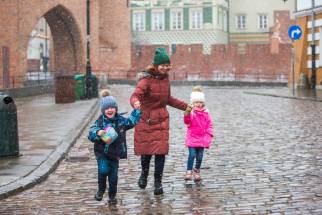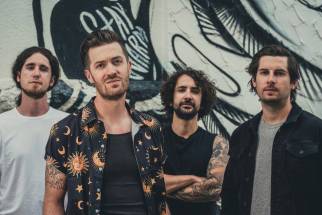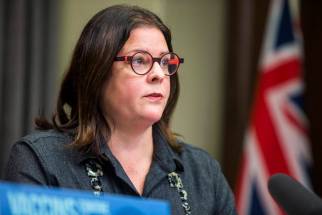‘The mother’s front’ Terrified, exhausted Manitoba-bound women fleeing Ukraine’s madness with their children put on brave faces, find ways to fill days in Warsaw with normal activities when life is anything but
Read this article for free:
or
Already have an account? Log in here »
To continue reading, please subscribe:
Monthly Digital Subscription
$0 for the first 4 weeks*
- Enjoy unlimited reading on winnipegfreepress.com
- Read the E-Edition, our digital replica newspaper
- Access News Break, our award-winning app
- Play interactive puzzles
*No charge for 4 weeks then price increases to the regular rate of $19.00 plus GST every four weeks. Offer available to new and qualified returning subscribers only. Cancel any time.
Monthly Digital Subscription
$4.75/week*
- Enjoy unlimited reading on winnipegfreepress.com
- Read the E-Edition, our digital replica newspaper
- Access News Break, our award-winning app
- Play interactive puzzles
*Billed as $19 plus GST every four weeks. Cancel any time.
To continue reading, please subscribe:
Add Free Press access to your Brandon Sun subscription for only an additional
$1 for the first 4 weeks*
*Your next subscription payment will increase by $1.00 and you will be charged $16.99 plus GST for four weeks. After four weeks, your payment will increase to $23.99 plus GST every four weeks.
Read unlimited articles for free today:
or
Already have an account? Log in here »
Hey there, time traveller!
This article was published 06/04/2022 (1345 days ago), so information in it may no longer be current.
WARSAW — On the long bus ride out of Ukraine, Nataliia Cherevko’s son, 11-year-old Bohdan, stopped eating. His stomach hurt. Behind them on the bus was another mother, with two sons, and one of them couldn’t eat, either. It was the stress, their mothers thought. It was being a child, and leaving everything they knew behind them.
As the bus rolled west from the heart of the country, Cherevko worried about her son. She worried as the bus came to a stop for a night somewhere near Cherkasy, after hearing that there might be danger ahead. She didn’t know where exactly it was; road signs had been taken down by Ukrainian forces, in an attempt to disorient Russian soldiers.
And she worried as they approached Lviv, where she planned to stay for a few nights so her son could rest and maybe even feel better. But when she asked the bus driver what she should do, he urged her to keep going, straight to the Polish border. There were volunteers there who could help them, he said. He hadn’t been there, but that’s what he’d heard.
Ukrainian refugee on her way to new life in Winnipeg
Ukrainian refugee on her way to new life in Winnipeg
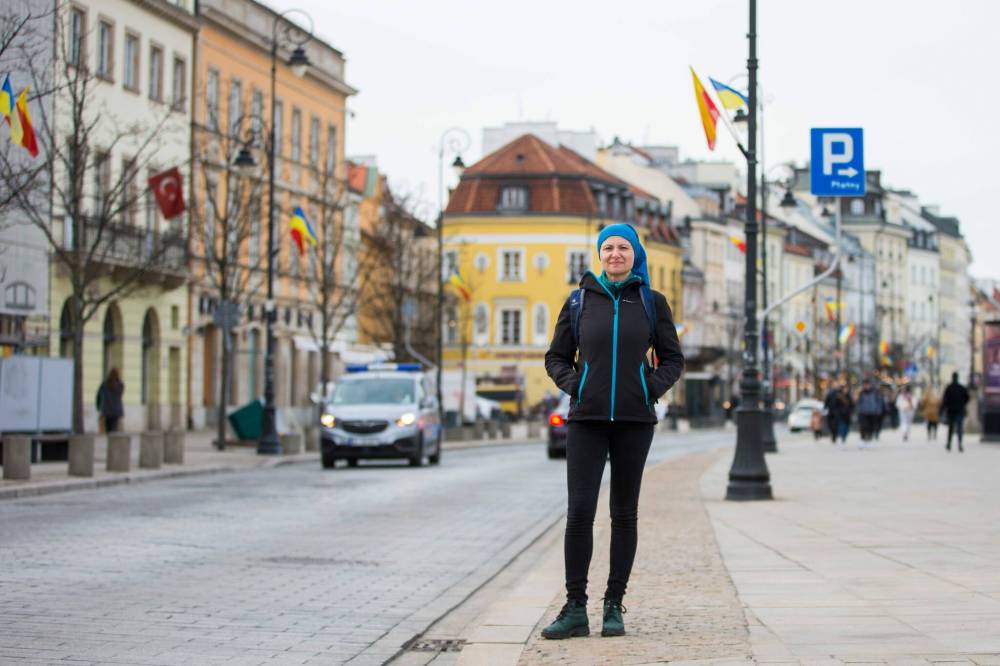
Posted:
WARSAW — It’s a bitterly cold morning in Poland’s capital, at the heart of the city’s diplomatic row. Outside the concrete-and-glass edifice of the Canadian embassy, about four dozen people are waiting, mostly women with children in tow.
Cherevko asked her son if he thought he could manage the journey just a little while longer.
“Ya budu syl’nym,” he replied, in Ukrainian: I will be strong.
Hours later, they walked over the border to Poland, alongside the other mother she had met on the bus. On the other side, they found volunteers, just like the bus driver had told them. The helpers came with pasta, and at last, Bohdan was able to eat. The next morning, they brought a breakfast of buckwheat porridge and meat, and again Bohdan was hungry.
Deep in her bones, Cherevko felt a wave of relief.
Now, all she had to do was make it to Warsaw, and start thinking about how to reunite with her husband, in Manitoba. It had been two years since her husband had moved to Portage la Prairie, where he’d found work that offered a better living than he could make in Ukraine; they’d planned to reunite someday, though immigration is an arduous process.

“My son didn’t know about our plans that we could move to Canada,” she says. “He was just going to school, and playing with his friends, and he knew that our father is in Canada, and he’s earning the money, and maybe we could explain that maybe someday we could go to another country. But we didn’t think that it would be so immediate.”
It’s a cold weekday morning in Warsaw, at an airy hotel near the outskirts of the city. The lobby is buzzing; like most hotels in Poland now, it is full of women and children displaced from Ukraine. Cherevko has met so many other families like hers, people who have come from as far as Mariupol, the southern city nearly totally obliterated in the fighting.
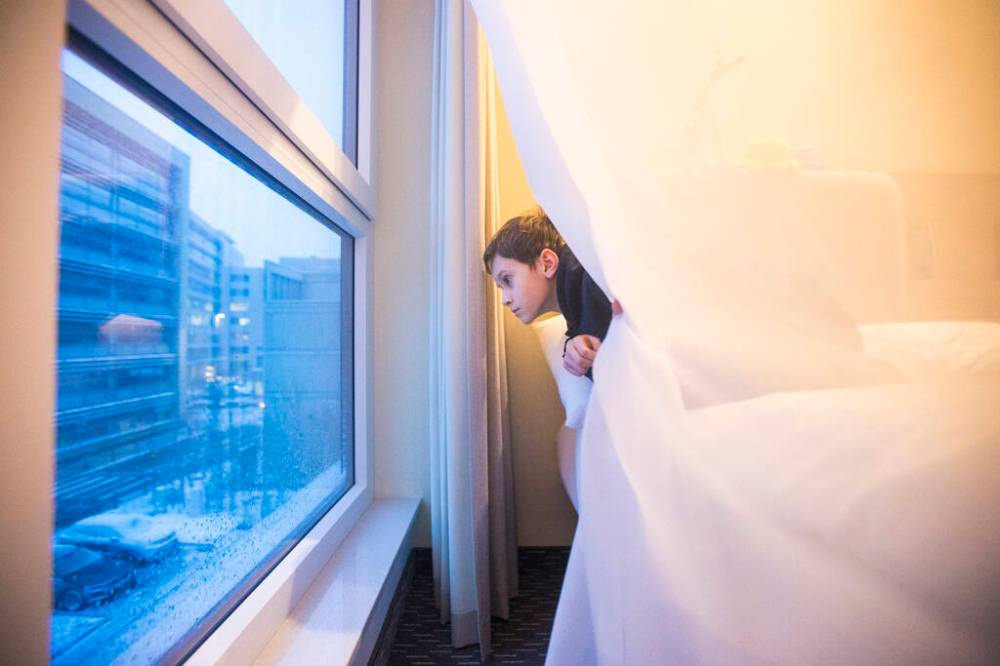
She still worries, in Warsaw. She worries about her 21-year-old daughter, who vowed to stay in Kyiv where she lives with her boyfriend, even after a bomb struck close to their apartment. “Vce dobre,” she tells her mother, when Cherevko urges her to leave: everything is good. Or: “bud’ spokiyna.” Stay calm.
“My son didn’t know about our plans that we could move to Canada… He was just going to school, and playing with his friends, and he knew that our father is in Canada… But we didn’t think that it would be so immediate.”
– Nataliia Cherevko
But it’s hard for a parent to be calm when a child of any age is far away, and where the parent cannot protect them.
“For me, for mother, my soul hurts,” Cherevko says. “For children we always want the best. We want they could be successful in their life. It’s the most important. They could be happy. Many people who were living in Ukraine, they were living to make their children’s life happier. But evil which is living in the world doesn’t give us the opportunity to live calm.”
And she worries about Bohdan. When they first got to Warsaw, she noticed how he would jump at loud noises, like the bang of a door closing in a hotel hallway, or some sort of loud noise from cars passing on the street. Anything that reminded them of the bombs that had shook the walls in Cherevko’s childhood hometown, where they’d first fled when the war started.
”I tried to explain to him that you are safe here,” she says. “Here you are in safe, and don’t be afraid.”
And she has tried to find something to fill the days, and to make life feel something like normal. Bohdan’s school in central Ukraine has moved to online learning, but without his textbooks it’s hard to keep up; one day, she took him to the Copernicus Science Centre, full of interactive exhibits for kids. Admission is free now for people displaced from Ukraine.
She started turning off the news of the war in front of her son; she could see how it made him afraid. Now, while they wait for news from the Canadian embassy about the status of their application to come to Manitoba, her son spends much of his time sitting quietly in their hotel room, watching videos on his laptop. He doesn’t complain.
“He is trying to stay strong,” she says, and as she gazes out the window, her eyes glaze with tears. “I don’t know what all is happening in his mind, because he doesn’t tell me everything… I’m trying to do my best to help him, to distract him. So we are just waiting.”
”I tried to explain to him (Bohdan) that you are safe here… Here you are in safe, and don’t be afraid.”
– Nataliia Cherevko
This is the story of Ukrainian refugee families across Europe, caught in a purgatory between the war, and what comes after. From Warsaw to Berlin, from Prague to London, mothers search for ways to protect their children from the fear and stress, and even to nurture something like a normal childhood: time to play, to grow, to rest and to learn.
“We have to be strong for our kids so they will feel better,” Ilona Protynyak says. “It’s our front with kids, the mother’s front.”
It’s early evening, at an elegant hotel at the heart of Warsaw’s old quarter. Protynyak has just finished putting her two kids, five-year-old Demian and four-year-old Milena, to bed. They were tired, Protynyak says: they’d spent the whole day at the Copernicus Science Centre, along with Protynyak’s mother, who came from Lviv to help tend the children.
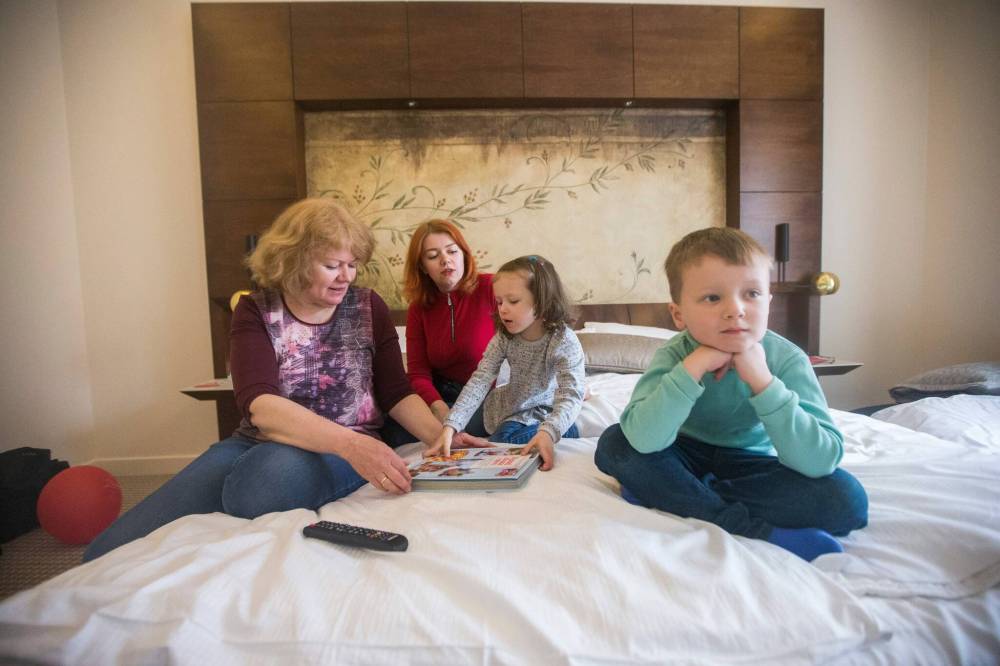
The days have been like that, for her family — full of activity. One day last week, they went to the zoo. On others, they simply stroll the cobblestone streets of old Warsaw. A souvenir shop nearby has a display of music boxes for sale: Demian delights in cranking their handles to coax out twinkling melodies by Warsaw-raised composer Frederic Chopin.
She takes dozens of videos, so that one day, she can show them that they made happy memories, in the midst of war.
“Most of the time we just walk around finding new places, new streets,” Protynyak says. “We say ‘Oh look, that’s beautiful,’ and they say, ‘Oh fine.’ Sometimes they’re tired but we want to show them as much as we can, because of the situation, we just can’t sit and wait. We have to make some fun for them, because they have to be kids and have their childhood.”
When she first took the kids out of Ukraine, she wasn’t sure what to tell them. They are too young to fully comprehend war, and she didn’t want to scare them: they were going on a trip, she told them. But then they started asking when they could go home, and when they could see their father who, like all men of fighting age, is forbidden from leaving Ukraine.
Milena is a “daddy’s girl,” Protynyak says, and took to kissing a photo of her father that they brought with them.
“When I call my husband, a lot of times they just want to talk to him. They will begin to cry,” she says. “Yesterday, the visa centre called me, and Milena was near me, and she said ‘It’s father!’ and she was just crying so sadly…. It’s a little bit better now. Because first days it was they didn’t understand what’s going on.
“When I call my husband, a lot of times they just want to talk to him. They will begin to cry.”– Ilona Protynyak
“They say, ‘Why? I want to go home. Are we going home today? Or maybe today? Or maybe today?’ Every day, ‘maybe today?’ But now they know that we will go somewhere else, we need to travel a little bit more to Canada. They’re OK, they’re afraid a little bit about planes. It will be their first time. But they know it is the war. I told them.”
Protynyak’s family, too, is anxious for news of when they will be able to go to Manitoba. After she’d decided to flee her home in Lviv, they’d made plans to go to stay with friends of the family, Winnipeggers who had met Protynyak’s family on a trip to Ukraine; their story was featured in the Free Press last month.
It’s not exactly that Protynyak wants to leave Ukraine. It’s more that when the war began, it felt like it shattered her dreams for her family’s life with it. She wonders what will happen decades in the future, when the children of Ukraine and of Russia are grown: will the violence now fuel a cycle that keeps churning, long after they are grown?
“I just want to take my kids out of all of this,” she says. “Because there is even this nuclear threat, if this happens it takes the whole Europe. So I just want to take them as far as I can. If there is an opportunity, I think that every mom will just take it, because everyone I think will be happy to take their kids as far as possible.”
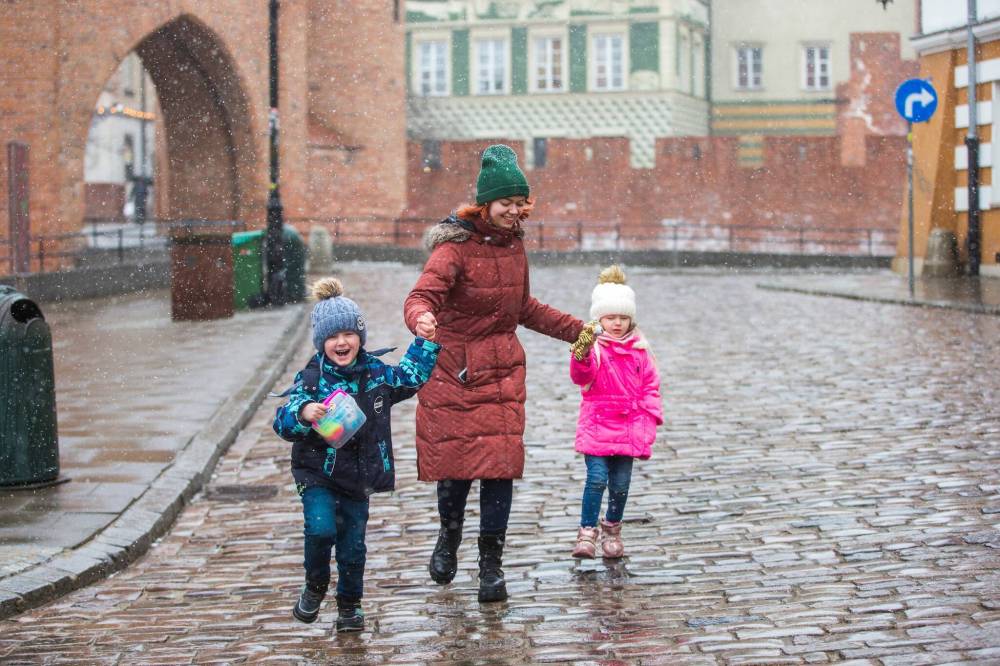
The kids should do well in Winnipeg, Protynyak thinks. She’s taught them a little bit of English, and shows them English cartoons: Demian confidently greets a Free Press reporter in English. He’s outgoing and chatty, and makes friends easily; Milena is quieter, but she goes everywhere Demian goes, and he loves to introduce people to his little sister.
She thinks about that one time, near the beginning of their journey from Ukraine, when Demian met a little boy around his age whose family had fled from Kharkiv. That boy only spoke Russian; as the kids puzzled out why they couldn’t understand each other, Demian comfortingly told his new friend that he could learn Ukrainian in school someday.
He’s like that: caring, friendly, curious about the people he meets. So yes, Protynyak thinks, he’ll thrive in a new country.
Until then, she will carry the weight of worrying for them. She wonders what kind of work she’ll be able to find in Winnipeg; before she had kids, she was a concert pianist, and now she works as a makeup artist, but she doesn’t know what that will be like in the city. She doesn’t know when the war will end, or when she’ll be able to see her husband again.
All she knows is that she is doing the best she can, to keep her kids safe. When a reporter tells her she is doing an amazing job as a mom, how incredible it is that, even with all that’s going on, her kids will remember these days in music boxes and zoo animals and science centre adventures, tears begin to stream down her cheeks.
She’s done all this for them. But what about her? What’s helping her to get through?
In the quiet of the empty hotel restaurant, she leans over the table, wipes her eyes with her sleeve, and laughs.
“I’m not sure,” she says. “Just some positivity that is inside, and looking at the kids. They are smiling? Good, I’m good. If they are good, I’m good too.”
melissa.martin@freepress.mb.ca
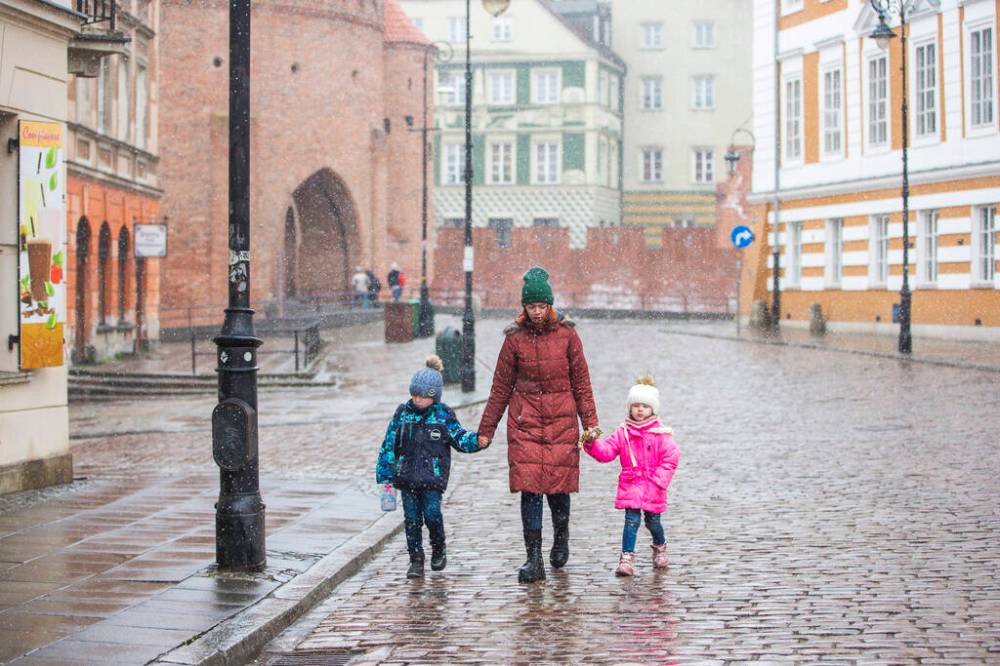

Our newsroom depends on a growing audience of readers to power our journalism. If you are not a paid reader, please consider becoming a subscriber.
Our newsroom depends on its audience of readers to power our journalism. Thank you for your support.
History
Updated on Thursday, April 7, 2022 1:32 PM CDT: Adjusts tags
Updated on Saturday, April 9, 2022 10:10 AM CDT: Removes print tag





